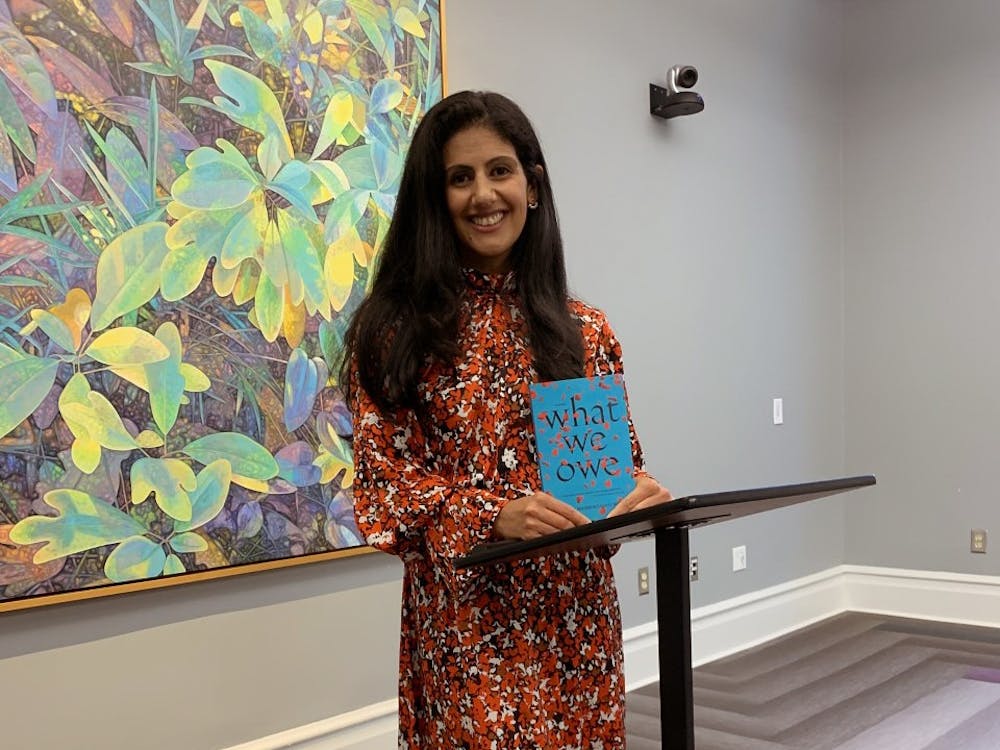For best-selling novelist Golnaz Hashemzadeh Bonde, her earliest memories of fleeing Iran have drastically shaped the way she writes and views the world.
Bonde spoke at the Kenan Institute for Ethics’s Roots and Routes series, which presents a collection of speakers for whom migrancy is more than an eight-letter word. She shared her family’s migration story and discussed her most recent book "What We Owe."
Bonde escaped from Iran as a toddler after her parents vehemently opposed the Islamic Republic of Iran, which usurped Mohammad Reza Shah in 1979.
“What I remember most is not my fear but that of my parents and grandfather, whom I thought I would never see again,” she said.
Bonde’s parents were able to secure fake passports and temporary work visas, and a trafficker smuggled the family into Europe with a few suitcases. Bonde’s mother insisted that her daughter take a picture in each of her finest silk dresses, as the family could not spare room for such luxuries.
Her family fled to Stockholm, Sweden, where Bonde grew up and where she currently resides with her husband and daughter.
Bonde considers herself incredibly fortunate to have evaded the fates of many of her parents’ countrymen.
“A lot of their friends, just a few years older than you undergraduates in the audience, were being killed on the streets, and we carried a lot of this loss with us,” Bonde said.
Throughout her childhood, she carried a deep fascination for her native land, practicing Farsi diligently in her home so as not to forget her heritage.
As a result of the distance from her culture, “(my) Iranian identity is very limited,” she said. “Some of my first memories are just of bombs falling rapidly from the sky.”
Bonde graduated from the Stockholm School of Economics and was later named a Goldman Sachs Global Leader.
She first gathered the idea for "What We Owe" in 2014 when a series of events occurred in short succession: the birth of her daughter, the death of her mother and the death of her grandmother.
Bonde laments the fact that her daughter will never know her maternal grandparents, yet her work manifests deep conversations at the dinner table about Iranian life.
The book itself reflects much of Bonde’s history with death, life and hope squeezed into fewer than 200 pages. She made an intentional decision to feature women’s voices, as men’s perspectives are already amplified under the hyper-patriarchal culture of Iran. Furthermore, she is seeking to dismantle the harmful stereotypes targeted toward Iranians in the West.
“It pulls all of us out of hatred” to hear from more marginalized perspectives, she said.
Using her books as a “very powerful way of saying goodbye” to her lost relatives, Bonde hopes to return to a different Iran someday and learn more about her family’s ancestry.
Additionally, Bonde wants to keep a collection specifically for her daughter, so that the latter has a strong female Iranian to admire. As the years pass, these books, like Bonde’s own personal stack of photographs from Iran, will enable her daughter to reminisce while delving into her own heritage.
Get The Chronicle straight to your inbox
Signup for our weekly newsletter. Cancel at any time.

